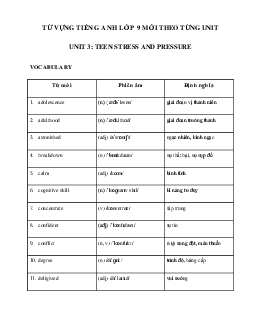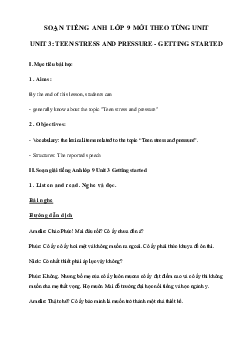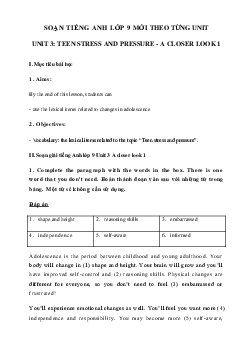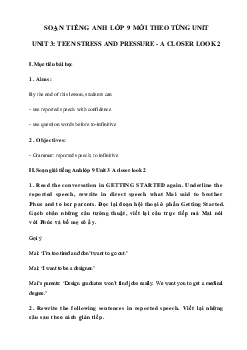


Preview text:
Luyện nghe Tiếng Anh lớp 9 Unit 3 Teen Stress and Pressure
Listen to a friend talking about stress. Choose the correct answer A, B, C or D
1. The topic of the talk is _____________.
A. beating stress in your life
B. avoiding stress to have a good life
2. Life in Hong Kong is _______________. A. peaceful and not stressful B. full of stress
3. The speaker says _______________.
A. you should be afraid of change
B. Changes are a normal part of everyday life
4. Families in Hong Kong _____________. A. have lots of people B. have few people
5. The speaker says ______________.
A. you should avoid other people to reduce stress
B. talking to other people helps to reduce stress
Listen to a man talking about the findings of a survey on teenagers’ stress. Decide if
the following statements are true (T) or false (F). According to the survey,
1. Unlike teenagers, adults don’t get stressed.
2. 30 – to – 70 - year olds are experiencing higher stress level than they consider to be healthy.
3. The most common reason for teenagers’ stress is school.
4. Thinking about what to do after high school is not a source of stress for teens.
5. Stress affects teens emotionally only. -The end-
Đáp án luyện nghe Tiếng Anh lớp 9 Unit 3: Teen Stress and Pressure
Listen to a friend talking about stress. Choose the correct answer A, B, C or D Gợi ý đáp án 1. A 2. B 3. B 4. A 5. B Nội dung bài nghe
I wanna talk about beating stress today. You know life here in Hong Kong is very
stressful so I think today’s topic is very useful for everyone because we can do something
about it, just to cope with the stress. So maybe you have some changes in your life,
maybe a big change and a small change, but instead of being afraid, I think you should
have a positive attitude and think of changes as a normal part of life.
(Tôi muốn nói về việc đánh bại sự căng thẳng ngày nay. Bạn biết đấy, cuộc sống ở Hồng
Kông rất căng thẳng nên tôi nghĩ chủ đề hôm nay rất hữu ích cho mọi người vì chúng ta
có thể làm gì đó để giải quyết vấn đề này, chỉ để đối phó với căng thẳng. Vì vậy, có thể
bạn có một số thay đổi trong cuộc sống, có thể là thay đổi lớn và thay đổi nhỏ, nhưng
thay vì sợ hãi, tôi nghĩ bạn nên có một thái độ tích cực và coi những thay đổi là một phần
bình thường của cuộc sống.)
And I think maybe here in Hong Kong, the families are crowded into a very small
housing space, so maybe you would sometimes argue with your family and I think trying
to resolve the disagreement with people is very important because then you can build
strong relationships and keep commitments you have made. For example, maybe you are
feeling alone and you want to have some company and I think asking the people you trust
for help is very important because if you have a bunch of friends, they can listen to you,
then you can release some stress through talking to them.
(Và tôi nghĩ có thể ở Hồng Kông, nhiều gia đình tập trung đông đúc trong một không
gian nhà ở rất nhỏ, vì vậy có thể đôi khi bạn sẽ tranh cãi với gia đình của mình và tôi nghĩ
rằng cố gắng giải quyết bất đồng với mọi người là rất quan trọng vì khi đó bạn có thể xây
dựng mối quan hệ bền chặt và giữ cam kết mà bạn đã thực hiện. Ví dụ, có thể bạn đang
cảm thấy cô đơn và bạn muốn có một người bạn nào đó và tôi nghĩ việc nhờ những người
bạn tin tưởng giúp đỡ là rất quan trọng vì nếu bạn có một nhóm bạn, họ có thể lắng nghe
bạn, thì bạn có thể giải tỏa bớt căng thẳng thông qua việc trò chuyện với họ.)
Listen to a man talking about the findings of a survey on teenagers’ stress. Decide if
the following statements are true (T) or false (F). 1. F 2. F 3. T 4. F 5. F Nội dung bài nghe
Stress isn’t jusst a problem for adults. Young people, too, frequently experience
unhealthy levels of stress, as the APA’s 2013 Stress in America survey shows.
The survey found that 13 to 17-year-olds are experiencing stress higher than they
consider to be healthy. School is the top source of stress for teens, followed by the
pressure of getting into a good college or deciding what to do after high school.
That stress is leading to emotional and physical symtoms that more than a quarter of
teens report symptoms including neglecting responsibilities, feeling overwhelmed, having
negative thoughts or changes in sleeping habits. More than a third reported feeling tired,
feeling nervous or anxious, or experiencing irritability and anger. Unfortunately, nearly a
third of teens said they weren’t sure if they were doing enough to manage their stress.
The good news: You can help your child learn to keep stress in check.




